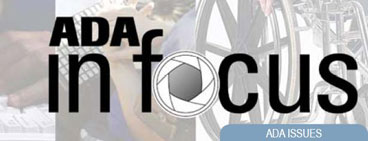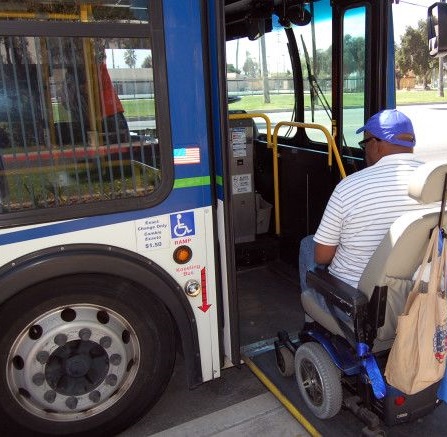Volume 25, Number 1
 ADA In Focus is published three times yearly by the Mid-Atlantic ADA Center.
ADA In Focus is published three times yearly by the Mid-Atlantic ADA Center.
ADA In Focus is intended for use by individuals, state and local governments, businesses, legal entities, and others interested in developments in the Americans with Disabilities Act. This publication is intended solely as an informal guidance and should not be construed as legally binding.
ADA In Focus does not serve as determination of the legal rights or responsibilities under the ADA for any individual, business or entity. Learn more about the Mid-Atlantic ADA Center.
Winter 2021, Volume 25, Number 1 (suitable for printing)
Winter 2021, Volume 25, Number 1, in large print (suitable for printing)
In this issue:
Focal Point
Telework as a Reasonable Accommodation
Of the many things the COVID-19 pandemic has drastically changed in our lives, employment is certainly at the top of the list. Last spring, millions of people were forced to leave the office and enter the virtual workplace. Even though vaccine distribution is underway and there is hope for an end to the pandemic, the virtual workplace is here to stay for many employees. Many employers have realized the benefits of having remote workers, and not only as a safety measure in times of a public health emergency. Employers may be able to reduce the need for expensive physical office space, and many workers are able to improve productivity when they are not spending time and energy commuting. Telework will likely become a more common practice than it used to be.
Some in the disability community wonder if the pandemic has permanently changed the way employers handle requests for telework as reasonable accommodations. Long before 2020, some believed employers were resistant to requests for telework, and that pressure to work in a physical office space was keeping people with disabilities from holding jobs. Now, they argue, the pandemic has proven that telework is feasible, and there is no longer any good reason to deny requests for this accommodation.
The U.S. Equal Employment Opportunity Commission (EEOC) recently stated that the regulations governing ADA accommodations have not changed in response to the pandemic and widespread telework. Employees should not assume that a request to work remotely will now be granted automatically. Employers can still deny requests to telework if alternative accommodations will effectively meet disability-related needs.
However, arguments for and against the feasibility of working remotely have undoubtedly been affected by the events of 2020. Many employers have discovered that business can go on even when the entire staff is teleworking. Employees with disabilities may want to request the continuation of telework when the employer calls the staff back to the office, and the fact that virtual work was successfully accomplished for many months could be strong evidence in favor of the request.
But employees should also be aware that the successful implementation of telework during the past year cannot simply be generalized to how work will be done in the future. When physical workplaces were closed, many employers adjusted or even suspended some job tasks – including, in some cases, essential job duties – but this was a unique situation. An employer is never required to remove essential functions as an accommodation for a worker with a disability. For example, if meeting in person with clients is an essential job function that was suspended because of the pandemic, an employer can require that it resume once it is again safe to meet in person.
Employers and employees should understand that requests for telework as reasonable accommodations under the ADA are handled the same way as requests for other types of accommodations. In general, requests for ADA accommodations are initiated by an employee with a disability-related need. The employee should let the employer know about this need and be prepared to provide documentation from a healthcare professional if either the disability or the accommodation need is not obvious.
Employers should be prepared to engage employees in a flexible, interactive process as soon as they become aware of an ADA accommodation need. If the request involves working remotely, the employer should first consider any existing policies, practices, or procedures that dictate how telework is handled. If employers already permit employees to work remotely for reasons other than disability, then a disability-related request should not be handled any differently. There is no reason to request medical documentation to verify a disability, for example, if other employees are routinely allowed to telework.
If telework is not generally allowed, then the employer can proceed with the ADA accommodation process. Employers don’t have to automatically grant an accommodation request, but do have to consider the feasibility and effectiveness of telework. If all of the essential functions of a job can be performed remotely, no alternative accommodations would be effective in meeting the disability-related need, and implementing telework does not create undue hardship for the employer, then the request should be granted.
It is important to remember that telework doesn’t necessarily need to be approached as an all-or-nothing proposition. Full-time telework may not be needed or appropriate in all cases. Like any accommodation, telework should be considered in light of both the disability-related needs of the employee, and the essential functions of the job. Some jobs can be accomplished entirely outside the workplace, and some can be accomplished through a combination of telework and in-person attendance. For example, an employee might only need to telework one day per week in order to manage medical treatments. If this employee requests full-time telework, the employer does not have to grant the request because it doesn’t match the disability-related need.
For more information on telework, check out the EEOC’s guidance on Work at Home/Telework as a Reasonable Accommodation and What You Should Know About COVID-19 and the ADA, the Rehabilitation Act, and Other EEO Laws.
Close-Ups: What's New
Subminimum Wages:
Impacts on the Civil Rights of People with Disabilities
The U.S. Commission on Civil Rights released this report about the Section 14(c) program, an exemption under the Fair Labor Standards Act which permits employers to pay less than minimum wage to some individuals with disabilities. The Commission collected data and testimony from members of Congress, Labor and Justice Department officials, self-advocates and workers with disabilities, family members of people with disabilities, service providers, current and former public officials, and experts on disability employment and data analysis; conducted two field visits to employment and service provision sites supporting workers with disabilities earning subminimum and competitive wages; and reviewed thousands of public comments in favor of, and opposed to, the 14(c) program.
The Commission, describing the “antiquated” program as “rife with abuse and difficult to administer without harming employees with disabilities,” found providers limiting participants’ potential while allowing providers and associated businesses to profit from their labor. Additionally, persistent failures in regulation and oversight have allowed the program to operate without meeting the needs of people with disabilities.
The report’s recommendations include:
- Congress should repeal Section 14(c), with a planned phase-out period to allow transition among service providers and people with disabilities to alternative service models that prioritize competitive, integrated employment.
- Congress should expand funding for supported employment services and prioritize capacity building in states transitioning from 14(c) programs.
- Congress should assign civil rights oversight responsibility and jurisdiction, along with the fiscal appropriations needed to conduct enforcement activities, either to the Department of Labor or to the Department of Justice Civil Rights Division, and should require the designated agency to issue an annual report on investigations and findings.
- During the phase-out period, Congress should require more stringent reporting and accountability for 14(c) certificate holders, and following the phase-out should continue to collect data on employment outcomes of former 14(c) employees.
Zoom in on Court Decisions and Settlements
DOJ and Amtrak Settlement: May 29 Deadline for Individual Claims
A settlement agreement between the U.S. Department of Justice (DOJ) and the National Railroad Passenger Corporation (Amtrak) will resolve DOJ’s findings that Amtrak violated the ADA by failing to make existing stations accessible. Amtrak will engage in a long-term plan to fix inaccessible stations. Additionally, a $2.25 million settlement fund has been established to compensate those harmed by inaccessible stations while trying to travel. Individuals with mobility impairments may be compensated if they traveled or wanted to travel between July 27, 2013 and December 2, 2020 at 78 specified stations with significant accessibility issues.
Visit Amtrak’s Notice of ADA Claims Fund to find more information, including a list of the 78 relevant stations. Claims must be submitted by May 29, 2021.
Settlement Agreement: Virginia Group Home Operator to Improve Communications with Deaf and Hard of Hearing Individuals
A settlement agreement between the U.S. Department of Justice (DOJ) and Good Neighbor Homes, Inc. (GNHI), which operates more than 50 group homes for individuals with intellectual and development disabilities (I/DD) in Virginia, will resolve allegations that GNHI failed to ensure effective communications with one of its residents, who is deaf.
A complaint filed with DOJ alleged that GNHI failed to provide sign language interpreting services for the resident at many important assessments, meetings, and appointments involving legal and medical matters, and that GNHI frequently enlisted the resident’s sister to facilitate communication.
GNHI will implement a comprehensive policy to train staff, assess needs, track requests, and provide appropriate auxiliary aids and services such as qualified sign language interpreters, hearing-aid compatible telephones, volume control telephones, videophones, and visual alert devices. In addition, GNHI will pay $225,000 to the resident, $40,000 to her sister, and a $50,000 civil penalty to the United States.
Spotlight: Cool Websites
Resources and Technical Assistance on Transportation

The National Aging and Disability Transportation Center (NADTC) provides training, publications, and resources to promote the availability and accessibility of transportation options for older adults, people with disabilities, and caregivers.
The National Center for Mobility Management (NCMM) promotes transportation options through partnerships between transportation agencies and organizations that provide health, social, and community services to older adults, people with disabilities, and/or low-income individuals and families.
The National Rural Transit Assistance Program (RTAP) offers training and technical assistance to promote rural and tribal transit collaborations and solutions.
The National Center for Applied Transit Technology (N-CATT) provides small-urban, rural, and tribal transit agencies with practical resources for replicable technological innovations and solutions.